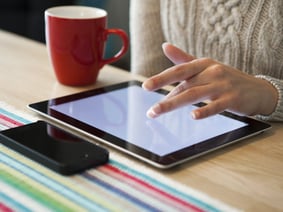Mobile Device and EHR Software Security: Is Your Practice Prepared?
With the rise of technology use in healthcare, security concerns and risks associated with using  mobile devices have been voiced by patients and professionals, with the chance of sensitive information getting into the wrong hands. HealthIT.gov has a ton of great resources to help you learn more about the things that you need to do to ensure security on your devices.
mobile devices have been voiced by patients and professionals, with the chance of sensitive information getting into the wrong hands. HealthIT.gov has a ton of great resources to help you learn more about the things that you need to do to ensure security on your devices.
Security of patient sensitive information should be your, and your software vendor's, top priority when using EHR software. While technology and IT security might not be your strong suit, there are simple steps you can take right now to help further ensure the safety and security of the mobile devices in your office, and the sensitive data they hold. We have gathered a few simple steps and tips you can take to fortify your security process. While some of these suggestions may seem like common sense, they are still necessary steps towards making your EHR software secure for you and your patients.
Tips on Keeping your EHR Software Information Safe
A Few Places to Start:
- If your mobile device is ever lost or stolen, utilize remote wiping. Remote wiping is a security feature that enables you to remotely erase the data on your mobile device. When you enable the remote wipe feature, you have the ability to permanently delete data stored on your lost or stolen mobile device.
- Do your research before you install mobile apps. Make sure you understand their security standards and safeguards.
- Keeping your security software updated seems like a no brainer, but you would be surprised how easy it can be to lag behind. Make sure you always install the latest versions of your security software.
- Set your preferences to automatically log you out after a short period of inactivity. And, make sure you and each of your staff members have unique, and secure passwords.
When in Public Spaces:
- When accessing your EHR software through your mobile device in public spaces, it is important to always have a password and privacy screen to keep wandering eyes away from patient information that might be visible on your screen. A pin or password can also protect from anyone who has somehow gained access, or stolen, your mobile device.
- Public Wi-Fi networks can be an easy way for unapproved users to find, and capture information from connected mobile devices. In order to protect and secure your software, only send or receive information when using a Virtual Private Network (VPN) connection. VPN connections are encrypted, which help ensure that the data is not readable if it happens to be intercepted on the public network you’re connected too.
Mobile Device Security at Home:
When your workday is over, but the work still isn’t finished, the security of your mobile device is still imperative.
- Always lock your screen, so a passcode must be entered to access the mobile device. You don’t want a three year old, or anyone else messing with your EHR information!
- Be sure to properly secure your home Wi-Fi network, and change the default administrator user names and passwords for extra security.
- Firewalls, which protect against unauthorized connections and information interceptions, should be updated and installed on your home Wi-Fi network. When you enable or install a firewall, you increase the security for your mobile device and the privacy of the health information on or accessed through the mobile device.

